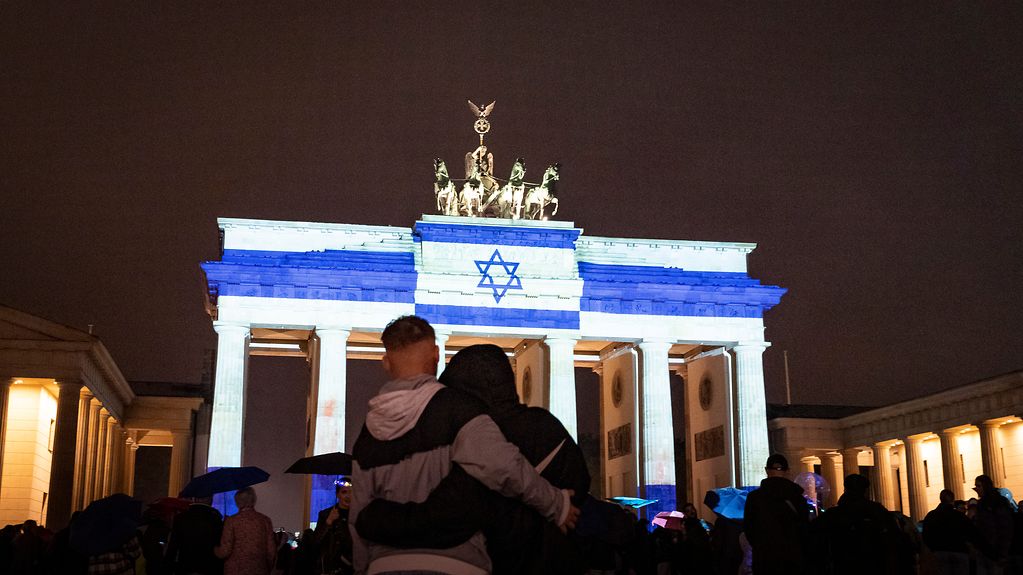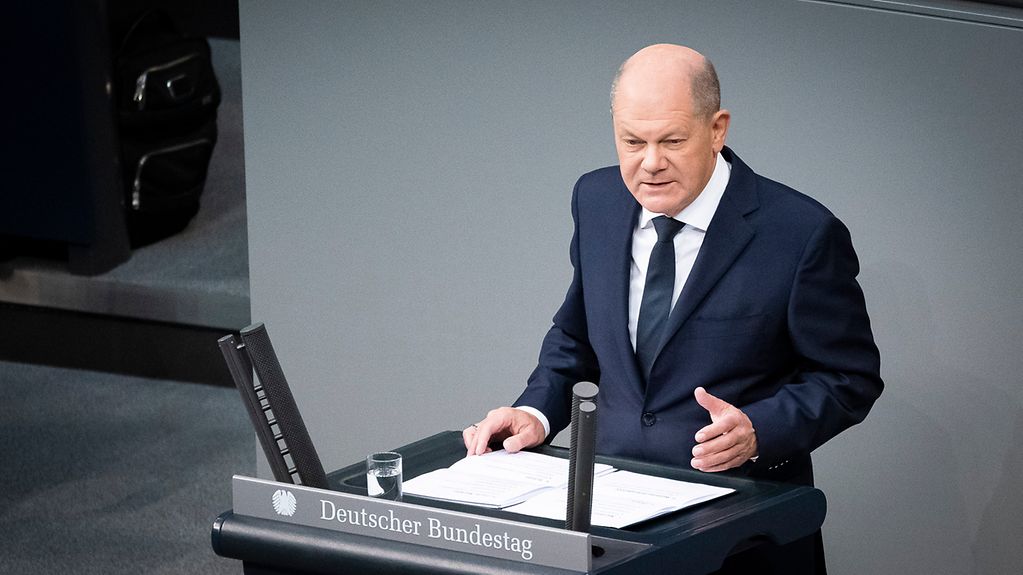Attacks on Israel
Federal Chancellor Scholz has condemned the attacks by Hamas on Israel in the strongest possible terms. He gave his assurance that Germany stood firmly alongside Israel. An overview of what the consequences of this are and how Germany is providing diplomatic and material assistance.
7 min reading time

In a sign of solidarity with Israel, the Brandenburg Gate was lit up in the colours of the state of Israel on Sunday evening.
Photo: Federal Government/Kugler
“On the morning of 7 October, Israel woke up to a nightmare.” This is how Chancellor Scholz described the callous attack by the terrorist organisation Hamas on Israel, shortly after it occurred. Hamas carried out an ambush, firing thousands of missiles into Israel from the Gaza Strip, executing over 250 young people at a music festival, and abducting dozens of Israelis to the Gaza Strip as hostages. These included people with German citizenship. Israel is still being bombarded with rockets.
FAQ of the German Embassy in Tel Aviv: Are you currently in Israel? Has your flight been cancelled? Are you worried about a relative? Here you will find answers to the questions that the Germany Embassy in Israel is currently receiving most frequently in connection with ongoing events in Israel.
Following the Hamas attack, Federal Chancellor Scholz spoke on the phone to Israeli Prime Minister Benjamin Netanyahu. The Federal Chancellor assured him: “The security of Israel is and will remain the raison d’état of the state of Germany. This remains true even during difficult times such as these. And we will act accordingly”, Scholz said.
The Federal Chancellor was one of the first heads of government to travel to Israel in the wake of the Hamas attacks. There he exchanged views with the Israeli Prime Minister and President, also meeting with relatives of the hostages, listening to them and expressing his sympathy.
In his government statement on 12 October, the Federal Chancellor stated: “At this moment, there is only one place for Germany: alongside Israel.” Germany’s history and the responsibility arising from the Holocaust made it Germany’s perpetual duty to stand up for the existence and security of Israel, said Scholz. The Federal Government is acting in accordance with this principle. On the same day, the Bundestag expressed its cross-party solidarity with Israel.

In the Bundestag, Federal Chancellor Scholz announced tough action against antisemitism and the glorification of violence in Germany: “A clear stand is needed here.”
Photo: Federal Government/Kugler
“Israel has a right to defend itself against these barbaric attacks, to protect its citizens, and to pursue the attackers.” The Federal Government is also supporting Israel by providing military and medical equipment. It also sees the suffering of the civilian population in Gaza, which is why it is holding talks to ensure that aid supplies are able to reach the Gaza Strip.
History of the Middle East conflict: One of the key disputes in the Middle East is the unresolved conflict between Israelis and Palestinians. When the British mandate over Palestine came to an end, Ben Gurion proclaimed the state of Israel on 14 May 1948. Since then there have been repeated armed conflicts with neighbouring countries. Another key issue here is the future of a separate state for Palestinians.
What the Federal Government is doing on the diplomatic front
Since the attack on Israel by the terrorist organisation Hamas, the Federal Government has been working hard to ensure that the situation does not escalate into a crisis that affects the entire Middle East. The Federal Chancellor has travelled in person to Israel and neighbouring Arab countries. The Federal Government is holding numerous talks in an attempt to defuse the situation and work towards the release of the hostages taken by Hamas.
The Federal Chancellor is not acting alone but firmly united with his ministers. The Foreign Minister has already visited Israel three times, holding talks in Egypt, Jordan, Lebanon, Saudi Arabia and the United Arab Emirates. She also attended the UN Security Council in New York and the meeting of the G7 foreign ministers in Tokyo to discuss the situation in the Middle East. Federal President Steinmeier , Development Minister Schulze , Defence Minister Pistorius and Education Minister Stark-Watzinger likewise visited the region to gain an impression of the situation and hold talks.
Two-state solution: Germany firmly believes that only a negotiated two-state solution that is acceptable to both sides can lead to lasting peace between Israelis and Palestinians. Negotiations will be pivotal: they are to ultimately result in an independent, democratic and viable Palestinian state – side by side in peace and security with Israel.
What the Federal Government is doing to free the hostages
The fate of the hostages abducted by Hamas in the Gaza Strip and their liberation is a key issue for Federal Chancellor Scholz and the Federal Government. The Federal Foreign Office has established a special task force for this purpose.
During the visit of the Emir of Qatar to Berlin on 12 October, Scholz stated clearly that the Federal Government was doing everything in its power to ensure the release of the hostages. In the meantime, the first hostages have been released – including German dual nationals.
What the Federal Government is doing in military terms
The aim of the government’s diplomatic efforts is to help de-escalate the situation in the Middle East. But Germany is acting on its pledge to stand firmly by Israel in other ways, too: Among other things, Federal Defence Minister Pistorius decided to provide Israel with medical materials, and also returned two drones to Israel that had been leased to Germany for Federal Armed Forces training.
At the same time, however, it is clear to the Federal Government and our partners that more must be done to protect the civilian population and civilian infrastructure, and in their telephone conversation on 9 December, the Federal Chancellor and the Israeli Prime Minister also discussed the efforts required to maximise the protection of civilians.
Travel and safety advice: Israel is formally in a state of war. The Federal Foreign Office has issued a travel warning for Israel, the whole of the Palestinian territories and Lebanon. You will find the travel and safety advice for Israel here.
What the Federal Government is doing on the humanitarian front
The humanitarian situation in Gaza has also worsened in the course of the fight against Hamas. There is no question that Israel has the right to defend itself. As the Federal Chancellor said, this also included providing the necessary humanitarian aid. Care must be taken to ensure that this does not fall into the hands of Hamas, however. At the beginning of the conflict, the Federal Government initially decided to review its provision of development aid to the Palestinian territories.
Aid for the Palestinian territories: The Federal Government provides humanitarian aid to help those in urgent need. The aim is to give people the chance to live in dignity and security and to ease suffering. Development partnerships have a different goal and are aimed at achieving long-term and sustainable improvements in social, environmental and political conditions. For decades, Germany has been one of the largest donors of humanitarian aid and development cooperation for the Palestinian territories.
But there is no doubt that Palestinians in need depend on our help. They too are victims of Hamas and its oppression. For this reason, Germany will continue to provide humanitarian aid, and this has now been increased once again.
The Federal Government is committed to doing everything possible to ensure humanitarian access to Gaza. This also includes special German flights with relief supplies for the civilian population in Gaza. Since 21 October, initial aid shipments have been able to use the Rafah border crossing in Egypt into the Gaza Strip. But in view of the humanitarian situation, it is clear that much more aid needs to reach Gaza. Together with its European partners, the Federal Government is also calling for “continuous, rapid, safe and unhindered access for humanitarian aid”.
The review of development cooperation is now also complete. The result: existing control mechanisms have proven robust. In other words, no evidence has been found that funds are being misused by terrorist organisations, for example. On this basis, the Federal Ministry for Economic Cooperation and Development (BMZ) will continue its development cooperation with the Palestinian territories in line with ongoing events. Nonetheless, the BMZ will continue to investigate suspected cases and respond consistently to any violations.